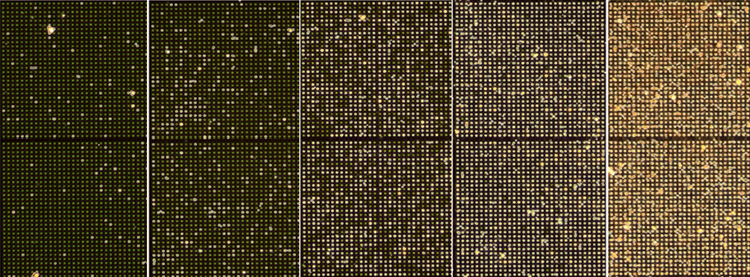News All News
April 2nd, 2020
Nanoneedle technology licensed for early disease detection, biomarker discovery, and more
Startup NanoMosaic to commercialize high-sensitivity tool for protein detection and quantification

Arrayed by the millions on a single chip, nanoneedles are able to detect both minuscule and abundant levels of molecules across the full proteome, providing critical information on the composition of a sample. (Image courtesy of NanoMosaic.)
A Boston-based startup company, NanoMosaic LLC, intends to commercialize a high-throughput, high-sensitivity platform for analyte detection developed at Harvard University. Through an exclusive license agreement with Harvard Office of Technology Development, NanoMosaic is developing screening tools based on functionalized ‘nanoneedles’ that may aid in a number of biomedical fields including the early detection of disease, prognostic monitoring, and biomarker discovery.
The potential applications also include infectious disease monitoring, including for COVID-19, as the platform could be used to measure antibody levels in patient samples over time, providing important information on the development of, or decline in, a patient’s immunity to the novel coronavirus.
The nanoneedle technology was created by Qimin Quan, PhD, while he was a Junior Fellow at Harvard’s Rowland Institute, along with others at Harvard. Each nanoscale needle bears an antibody that can bind with a specific protein of interest. Upon binding, the needle changes color to signal its catch. Arrayed by the millions on a single chip, these nanoneedles are able to detect both minuscule and abundant levels of molecules across the full proteome, providing critical information on the composition of a sample.
“These innovations allow for a highly sensitive detection of a broad range of analytes with low sample volume,” said Quan, who has left Harvard to become Chief Scientific Officer of NanoMosaic and the company’s technology founder. “Leveraging CMOS technology in fabrication, the enhanced technology allows for label-free analyte detection, rapid assay development, and low-cost consumables, thus allowing the user to quantitatively query a wide dynamic range of proteins on one platform.”
Combined with the company’s own enhancements, nanoneedles enable high-sensitivity detection levels of proteins, nucleic acids, and a variety of additional high- and low-abundance analytes, according to NanoMosaic CEO John Boyce. The platform technology has high multiplexing capabilities with simple label-free reactions, enabling biomarker discovery and validation on a single chip.
“Our company’s MosiacNeedles range between 100–1000 times smaller than conventional beads used in most molecular biology and protein assays,” said Boyce, who is also cofounder of Tiger Gene. “This allows for analyte interrogation across seven orders of dynamic range with an overage of sites to enable high-throughput sample processing. The sheer number of MosaicNeedles on a NanoMosaic consumable allows one to ask questions that account for both depth and breadth across the proteome and genome.”
Boyce notes that the platform could be used in oncology or neurology to detect protein biomarkers indicative of disease, both at an early stage and over time. In research uses, it could also be used to detect patterns in patient samples to uncover novel biomarkers of disease.
NanoMosaic is a biotechnology company with investment from the Boston-based venture capital firm Tiger Gene.
Tags: diagnostics, Startups
Press Contact: Kirsten Mabry | (617) 495-4157
